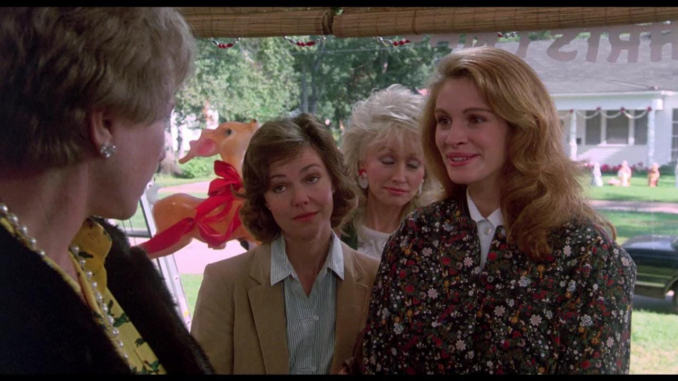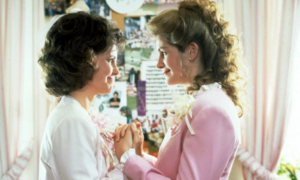
Sally Field’s Heart-Wrenching Five Stages of Grief in Steel Magnolias – A Masterclass in Acting
Few cinematic moments are as universally haunting as Sally Field’s heart-wrenching performance in Steel Magnolias (1989), where she navigates the five stages of grief following the tragic death of her daughter, Shelby. Directed by Herbert Ross and adapted from Robert Harling’s play, the film explores the complex, multi-faceted nature of loss, love, and resilience. At the center of it all is Field’s portrayal of M’Lynn, a mother who must come to terms with the unthinkable—burying her child.
In one unforgettable scene, Sally Field delivers a raw, emotional breakdown that takes her character—and the audience—through the stages of grief: denial, anger, bargaining, depression, and acceptance. It is one of the most iconic performances in film history, showcasing Field’s unmatched ability to communicate the depth of sorrow, the ache of a mother’s heart, and the agonizing process of finding a way to move on.
This article will analyze Sally Field’s portrayal of the five stages of grief in that pivotal scene and explore why it remains a masterclass in acting that resonates deeply with audiences decades after the film’s release.
1. Denial – “I want her here!”
The first stage of grief is denial, a defense mechanism that protects individuals from the overwhelming reality of loss. In Steel Magnolias, M’Lynn begins her grief journey in denial, refusing to believe that Shelby is truly gone.
As M’Lynn, Sally Field delivers one of the most emotionally charged lines in the film: “I want her here!” The desperation in her voice and the anguish in her eyes reveal a woman caught between the truth she cannot bear and the reality she cannot accept. In this moment, M’Lynn is not only speaking to her friends but also to herself, desperately trying to will Shelby’s return.
Field’s portrayal of denial is subtle yet powerful. Her body stiffens, her breath quickens, and her entire demeanor shifts as she grapples with this overwhelming sense of disbelief. The strength of Field’s performance in this stage is not in shouting or overt display but in the quiet, painful tension that underscores M’Lynn’s refusal to acknowledge the finality of death.
2. Anger – “I don’t want to hear this!”
The second stage of grief is anger, where the bereaved often feel frustration, helplessness, and resentment. For M’Lynn, this manifests in an outburst of fury, as she confronts her friends, shouting, “I don’t want to hear this!”
In this pivotal scene, Field’s intensity increases as her anger spills out, not just at the loss of Shelby, but at the perceived injustice of it all. Her character rages against the unfairness of life, the suddenness of death, and the futility of the efforts to change it. The anger is palpable—M’Lynn is furious that this beautiful, vibrant young woman, her daughter, has been taken from her so cruelly.
Field’s ability to move from quiet denial to an explosive outburst of anger is breathtaking. Her voice rises in pitch, her face contorts with emotion, and her gestures become more frantic. What makes this moment so raw is the combination of grief and frustration—M’Lynn wants to scream at the world for taking away the one person she loved more than anything. Field’s performance is a testament to her range and depth as an actress.
3. Bargaining – “I would’ve done anything…”
The third stage of grief is bargaining, where individuals often try to make deals with fate or a higher power, wishing they could have done something to prevent the loss. This stage is typically marked by feelings of guilt and desperation.
In Steel Magnolias, M’Lynn expresses this stage when she says, “I would’ve done anything to take her place.” The pain in these words is almost unbearable, as M’Lynn attempts to reconcile the brutal truth that she couldn’t protect her daughter, no matter how much she loved her. It’s a heartbreaking admission that, despite all the love in the world, she could not save Shelby from the illness that took her life.
Sally Field’s performance here is exquisite. Her tone is softer, filled with vulnerability and regret, and her body language is more subdued. She is no longer angry or frantic; instead, she’s reflecting on the past and wishing she could turn back time. Field’s ability to convey such deep regret without overplaying the emotion is a testament to her skill as an actor.
4. Depression – “I just want to die.”
The fourth stage of grief is depression, where the bereaved often experience a profound sense of sadness, hopelessness, and despair. It is during this stage that M’Lynn hits her emotional low point in the film.
As she sits, slumped and defeated, M’Lynn utters the heart-wrenching words, “I just want to die.” The devastation in these words is amplified by the way Field delivers them—softly, as though she can barely muster the strength to speak. It is a raw, unfiltered expression of a mother’s worst nightmare: losing a child and feeling as though there is nothing left to live for.
This moment is an emotional abyss. Field’s voice breaks, her shoulders sag, and her eyes are filled with unshed tears. She is not just mourning the loss of Shelby; she’s mourning the loss of herself. She no longer knows who she is without her daughter, and Field perfectly captures that overwhelming, suffocating sorrow. It is a difficult scene to watch, but Field’s restraint and subtlety make it even more powerful.

5. Acceptance – “She was so good.”
The final stage of grief is acceptance, where the individual comes to terms with the reality of their loss and begins to move forward, though not without immense sadness.
In the final moments of this scene, M’Lynn finds a way to reflect on Shelby’s life, saying, “She was so good.” There is a quiet strength in these words, as M’Lynn acknowledges Shelby’s beauty, kindness, and spirit, despite the tragedy of her death. The acceptance is not without pain, but it is a necessary part of the healing process.
Field’s performance in this moment is a masterclass in restraint. She has gone through the emotional wringer, and yet, in this final line, she expresses a sense of peace, not because the pain has gone away, but because she has found a way to honor Shelby’s memory. Her voice is gentle, and her expression is one of quiet sorrow—this is a mother who, while devastated, is learning to live with the loss.
Why Sally Field’s Performance in Steel Magnolias Is Unforgettable
Sally Field’s portrayal of M’Lynn in Steel Magnolias is more than just a performance—it is an emotional journey that mirrors the complex, often conflicting stages of grief that so many people experience when they lose a loved one. Her ability to capture the intricacies of denial, anger, bargaining, depression, and acceptance with such depth and authenticity makes this scene one of the most powerful moments in film history.
What makes Field’s performance so unforgettable is her emotional honesty. She doesn’t shy away from the pain of loss; instead, she embraces it, allowing the audience to feel every ounce of M’Lynn’s grief. Whether she’s shouting in fury or speaking softly through tears, Field’s portrayal is raw, relatable, and deeply human. It’s a testament to her exceptional talent that, even years after the film’s release, her performance continues to resonate with viewers.
Conclusion: A Masterclass in Emotional Range
Sally Field’s breakdown in Steel Magnolias remains one of the most memorable and emotionally charged scenes in cinema. Her portrayal of the five stages of grief is not just an acting achievement—it is a raw, unfiltered exploration of human loss. From the gut-wrenching denial to the soft acceptance of a mother’s sorrow, Field’s performance captures the complexity of grief in a way few actors have ever done.
If you haven’t watched Steel Magnolias, or if you haven’t revisited it in a while, take the time to experience Sally Field’s unforgettable performance. It’s a lesson in acting, in grief, and in love—a true masterclass in conveying the most profound emotions we can face.
